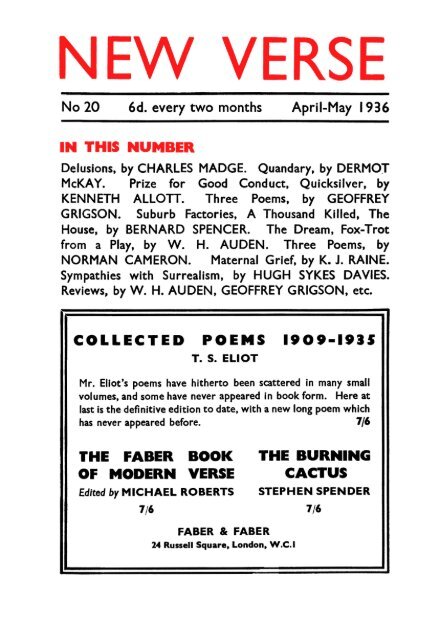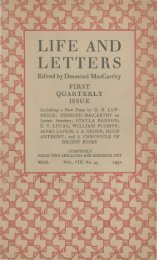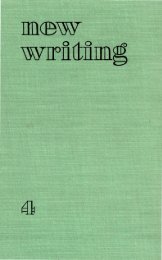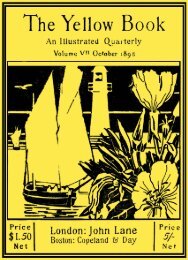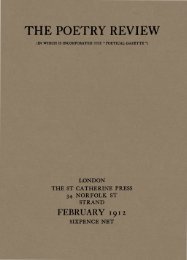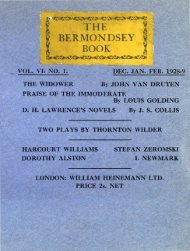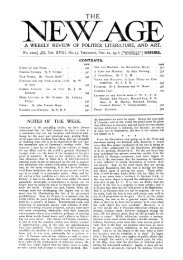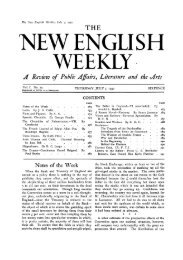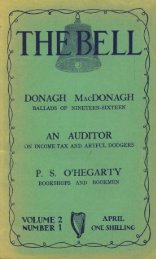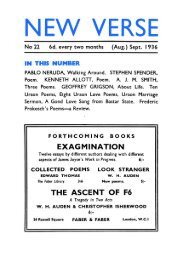New Poetry - Modernist Magazines Project
New Poetry - Modernist Magazines Project
New Poetry - Modernist Magazines Project
Create successful ePaper yourself
Turn your PDF publications into a flip-book with our unique Google optimized e-Paper software.
NEW VERSE<br />
No 20 6d. every two months April-May 1936<br />
IN THIS NUMBER<br />
Delusions, by CHARLES MADGE. Quandary, by DERMOT<br />
McKAY. Prize for Good Conduct, Quicksilver, by<br />
KENNETH ALLOTT. Three Poems, by GEOFFREY<br />
GRIGSON. Suburb Factories, A Thousand Killed, The<br />
House, by BERNARD SPENCER. The Dream, Fox-Trot<br />
from a Play, by W. H. AUDEN. Three Poems, by<br />
NORMAN CAMERON. Maternal Grief, by K. J. RAINE.<br />
Sympathies with Surrealism, by HUGH SYKES DAVIES.<br />
Reviews, by W. H. AUDEN, GEOFFREY GRIGSON, etc.<br />
COLLECTED POEMS I9O9-I935<br />
T. S. ELIOT<br />
Mr. Eliot's poems have hitherto been scattered in many small<br />
volumes, and some have never appeared in book form. Here at<br />
last is the definitive edition to date, with a new long poem which<br />
has never appeared before. 7/6<br />
THE FABER BOOK THE BURNING<br />
OF MODERN VERSE CACTUS<br />
Edited by MICHAEL ROBERTS STEPHEN SPENDER<br />
7/6 7/6<br />
FABER & FABER<br />
24 Russell Square, London, W.C.I
DELUSIONS<br />
Where are the dancing girls ? They are not here.<br />
Not here ? Then back into the night again,<br />
The night of images that disappear<br />
And reappear to mock the tired brain.<br />
We have no home. Our bourgeois home is wrecked.<br />
We seek instead the shadowy consolation<br />
Of glimmering alcohol, and still expect<br />
The unexpected of our own creation.<br />
For we create—proud tyrants of a moment—<br />
Bright visions, born between despair and fear,<br />
And, in possessing them, survive our torment.<br />
Where are the dancing girls ? They are not here.<br />
They are not here. They are not in the street.<br />
No corner holds them, and no glass swing door<br />
Admits us to the presence. Still we meet<br />
The blank appearance that we met before :<br />
Glittering spectacle of the lonely bar<br />
And the society which there forgets<br />
Itself, while the routine of things that are<br />
In fantasies that are not, dissipates.<br />
Behind the glasses and the polished board,<br />
Behind the faces as they change and smile,<br />
Promises of delusion seem assured<br />
And homeless wanderers soothe their long exile.<br />
Beyond the printed words that catch their eyes,<br />
And the chance gleam of some suspended sign<br />
May come the blissful moment of surprise<br />
When the dull bourgeois can become divine.
II<br />
To those who sail the salt quotidian sea<br />
The tempting syren sings across the flood,<br />
But once plunged in, they find her out to be<br />
A desert island with a coast of mud.<br />
Lulled by the waves, no mortal heart resists<br />
The gaudy scenery of the noble bay,<br />
That paradisal image which persists<br />
In all its brightness to the present day.<br />
Each one is Tantalus to what he dreams,<br />
The waters of illusion lap his chin,<br />
Ready to hand the flattering symbol seems<br />
And Tantalus is always taken in.<br />
Each day he starts, he leaps towards the goal,<br />
Driven along by life's impulsive tide.<br />
His wishes are no more in his control<br />
Than the bright objects which his eyes provide.<br />
Boasting each project absolutely new,<br />
His rising sciences, renascent arts,<br />
All that he frames has one grand aim in view,<br />
One which is not declared but simply starts.<br />
Automaton of fate, led on by time,<br />
He learns no lesson from repeated pain.<br />
Like the old lag, he knows the price of crime<br />
And yet he cannot help but try again.<br />
Till, one fine day, still hoping against hope<br />
In spite of all this once to be exempt<br />
From nature's warrant and the hangman's rope,<br />
The bourgeois perishes in his attempt.
Ill<br />
Pillage the great unruly crowd invites<br />
To take the bourgeois palaces by storm.<br />
The sheets of glass, the softly shaded lights<br />
Attract, induce the ugly murmuring swarm.<br />
Fingers that grab, and hands that overturn<br />
Obey their prompted nostrils over-wrought<br />
With female scent diffused, and rebels burn<br />
What in their slavery they would once have bought.<br />
Into charred ash high priced silks disappear,<br />
Up blazes all the furniture of class<br />
And frightened lift-girls fill the shafts with fear<br />
Wounded by splinters of the shivering glass.<br />
Basement and Mezzanine with turmoil swell,<br />
But look ! some little Lenin of the mob<br />
Breaks with harsh reprimand the lustful spell<br />
Raising his voice : " Our task is not to rob<br />
44 Since not to us but to the workers' state<br />
These folded silks, this glittering trash belong.<br />
For us meanwhile more pregnant works await<br />
Than useless vengeance adding wrong to wrong.<br />
" No doubt in time you too such silks shall wear<br />
When luxury shall crown the common toil<br />
And jewels glitter in the shop girl's hair<br />
And gold and silver round her wrists shall coil<br />
44 Symbols of love, relating then no more<br />
To the exploited, suffering, human mass,<br />
Incentive to no vast imperial war<br />
But innocent and valueless as glass.<br />
44 Then bide your time. That time has not come yet.<br />
Meantime replace the spoil, put out the flames.<br />
At every entrance let a guard be set."<br />
Thus in his generous anger he exclaims.
The guilty crowd recoils ; passion subsides,<br />
Passion that long had known the secret goad<br />
Of property that on men's shoulders rides :<br />
They glimpsed her, bowed beneath the insulting load.<br />
The moment came. She fell into their power.<br />
Her, disinvested, helpless now they saw,<br />
But felt, as they rushed forward to deflower,<br />
The bayonet of proletarian law.<br />
See, as they stumble out upon the kerb,<br />
The brain still glowing with desire undone,<br />
They turn their backs upon the pile superb<br />
And return home, the last illusion gone.<br />
IV<br />
Sometimes at evening travellers have heard<br />
The speaking dunes of ever shifting sand<br />
Utter a note as shrill as any bird,<br />
While the wind creeps across the cooling land.<br />
Sometimes the sight of gently waving green<br />
Invites the weary traveller's footsteps on<br />
Refracted far across the waste between,<br />
But, one step more, the glancing palms are gone.<br />
The secret of the desert is a stone<br />
Because the stone contains once living things.<br />
The fossil breccia has to marble grown,<br />
Which to new life the chiselling sculptor brings.<br />
Thousands who live in ignorance and pain<br />
Build up the giant pyramid of life.<br />
Their dust, the desert, covers all the plain<br />
Except the uncanny sphinx, their hieroglyph.<br />
CHARLES MADGE
QUANDARY<br />
The earth was snow-shod : and the ferns were gnomes in the stubble<br />
Blind in the darkness waiting the emerald eye,<br />
And crucible question of Hamlet, limb for limb struggle.<br />
Hamlet said, * Conscience turns currents awry.'<br />
In the twin moment the sun discovers the haunches<br />
And tubes of the wood commencing osmosis beneath.<br />
Movement begins in the twined capillary branches<br />
And the sap executes quick course in the sheath.<br />
Samson surrendered in pruning, strength is in growth.<br />
This is the wisdom developing swiftly in channels<br />
Involving the fjord and the landway, coupling both,<br />
And the ice-gutted boats with bearded funnels.<br />
The earth was snow-shod : but suddenly now refraction<br />
Shot in the emerald flash : surge bubbled for motion.<br />
And now in the second she seized the green venture of action<br />
And sped indigo toward the ocean.<br />
Here was the flow of release but I remained leashed :<br />
Where the earth was ice-shod and the corpse of the northern<br />
nation.<br />
And turned to the huddled dwellings where the sailors fished<br />
And hum-drum the sea hob-nobbed the vegetation.<br />
6<br />
DERMOT MCKAY<br />
PRIZE FOR GOOD CONDUCT<br />
Will you take a seat ?<br />
The War will soon be over.<br />
The state requires<br />
my wedding ring and my apostle spoons<br />
my sons.<br />
There will be a special service in the cathedral<br />
after which the clergy will be disbanded<br />
and the fane profaned and put to immediate service
to manufacture wooden legs for heroes<br />
with a profitable side-line in glass-eyes<br />
and employment found for over two hundred widows.<br />
The feverish wounded in the base hospital<br />
the nurse's coif becomes a phallic symbol<br />
he hears the red cool drop and the cistern filling ;<br />
and the stripped dead buried in ungainly postures<br />
their lucky charms sent back with kindly letters ;<br />
the invalids sent home with eyesight failing<br />
to sit on a waiting list for operations<br />
and never to be put off iron rations ;<br />
and the nervous shipwrecked bodies in lovely grounds<br />
set aside by old ladies with unearned incomes,<br />
crucified nerves which come to life obliquely :<br />
the cows are licking the shadow from the field<br />
the wasps buzz angrily in the stoppered bottle<br />
the devil comes daintily over the stepping stones<br />
they sit in the sunshine, crying no rest for the wicked.<br />
QUICKSILVER<br />
KENNETH ALLOTT<br />
All good people rise for the National Anthem<br />
the hand gripping the razor in the pocket<br />
the hand clenched in the hair, scrubbed in the basin<br />
the knot of curious watchers at five to eight<br />
the future with crossed knees<br />
the kissing of blood relations<br />
the future bed-ridden<br />
expenditure on flowers<br />
the future behind your back<br />
sweet conception of Judas<br />
the future lock, stock and barrel<br />
all the hymns carefully chosen
uttered with nostalgia<br />
the icy roof of the world<br />
the gipsy warns you that the birds fly south<br />
they steal away your youth<br />
torn to pieces by sharp teeth<br />
powdered by groined and gritty rocks<br />
the splintered sun among the splintered rocks<br />
the braces the bananas the papers the cotton frocks<br />
and the wind spinning the band at will<br />
the long rollers of the sea now strongly turning in<br />
and the future hidden from us.<br />
THREE POEMS<br />
1. SEVERAL OBSERVATIONS<br />
The hours of the public place :<br />
In the morning hour the old<br />
Man with his nurse meets<br />
The child with her nurse, between<br />
The rosebed and the violas.<br />
At three the students with<br />
Their theodolites and red<br />
And white and black poles<br />
Measure the known heights,<br />
And the scarlet and the green<br />
Footballers pattern their knees<br />
In the wind, by the black wood<br />
Where the caterpillars spin.<br />
And the evening hour, when<br />
The purple mallards are<br />
Saying ach ach on the pond,<br />
When the man dressed in ochre<br />
Spikes the silver paper, and<br />
The sweaty lover squirms<br />
Under the lime tree*<br />
KENNETH ALLOTT
2. THREE EVILS<br />
When the sky has the ominous<br />
Colours of a bruise, even then<br />
Bother less over the spirits from the sky<br />
Than the spirits from the earth :<br />
They are up under your feet<br />
Before the sun goes, they frequent<br />
The urinals, the henbane heap,<br />
The oil patches of the lorry yard.<br />
Be very careful about them,<br />
Be careful about the invalid,<br />
Stubbly, in slack flannel, who<br />
Reclines on the river balcony.<br />
And I warn you last—she is the<br />
Worst evil—against the Sybil,<br />
The rare Marocaine who foresees<br />
Events in a mirror of tar.<br />
3. FOUR OCCUPATIONS<br />
It is winter and the beggar ties<br />
Brown paper round his stumps<br />
Where he sits by the wall,<br />
And in the studio Blessed Prufrock<br />
Talks of the man from Buffalo, who<br />
Burnt his pants by the fire,<br />
And in the wood the gamekeeper<br />
Who lives alone, fattens<br />
His sow in a hollow tree,<br />
And with Blessed Prufrock the son<br />
Of the psychoanalyst talks about<br />
Cements, and Jefferson, and<br />
Oyster shells and edible mushrooms,<br />
And through the thick pool the lean<br />
Salmon slides to the tide.<br />
GEOFFREY GRIGSON<br />
9
10<br />
SUBURB FACTORIES<br />
White as a drawing on white paper<br />
The architect built the tall<br />
Suburb factories,<br />
Compact as a liner admired from the littered beach,<br />
Gaunt like the ward of a hospital.<br />
And when he sunk their roots among<br />
The places of spare trees<br />
The huts and the wastes,<br />
To stare down the polished arterial road,<br />
And to peer across the chimneys,<br />
Made the big concrete mushrooms grow,<br />
Towers with gland-heads ;<br />
He edged to the cliff<br />
The doomed life of the villas ; fastidious streets,<br />
Men signed with their fathers' manual trades,<br />
Their faces curiously primmed and clenched<br />
If perhaps they can leap above the memory<br />
Of those scorned trades.<br />
Stamping, the concrete brushes down their fences,<br />
It brings drilled crowds, small property.<br />
From the diamonded parks I would wish to delight<br />
At shapes that attack and are new :<br />
But it's hard,<br />
Knowing only for certain ; power is here surrendered<br />
And it changes to the hands of the few.<br />
Changes though ; change is the air ; roofscape<br />
Touches some nerve, and the lost<br />
Sinking scream<br />
Of electric trains touches it, and white masonry<br />
Springs up like a fire, but strikes like frost.<br />
BERNARD SPENCER
A THOUSAND KILLED<br />
I read of a thousand killed.<br />
And am glad because the scrounging imperial paw<br />
Was there so bitten :<br />
As a man at elections is thrilled<br />
When the results pour in, and the North goes with him<br />
And the West breaks in the thaw.<br />
(That fighting was a long way off.)<br />
Forgetting therefore an election<br />
Being fought with votes and lies and catch-cries<br />
And orator's frowns and flowers and posters' noise,<br />
Is paid for with cheques and toys :<br />
Wars the most glorious<br />
Victory-winged and steeple-uproarious<br />
. . . With the lives, burned-off,<br />
Of young men and boys.<br />
J & J BERNARD SPENCER<br />
TH E HOUSE<br />
There that terrible house, those corridors<br />
Fluffed with sound-proof material<br />
Where a glove is drawn over feel of good and evil:<br />
And men move whom wages move, but without belief.<br />
Wages and hum-drum made the thin, forbidden,<br />
Mouth of this young girl. She admires a man<br />
Who has not seen her. How she smiles at her hands<br />
In secret, as if sharing a joke with someone.<br />
A simpleton claws at money across my mind.<br />
A speed-king hunches in his cockpit. Lovers<br />
Go spry to the pictures—it is Saturday. Marchers<br />
Sing, furrow the fountained square : Whom fanaticism,<br />
Hunger, hunted ; speed to crumple distance<br />
Or any lust electrified to burst bound<br />
From that terrible house ; them I stand with outside.<br />
That house I know : I live now : therefore love them.<br />
BERNARD SPENCER<br />
II
12<br />
THE DREAM<br />
Dear, though the night is gone,<br />
The dream still haunts to-day,<br />
That brought us to a room,<br />
Cavernous, lofty as<br />
A railway terminus ;<br />
And crowded in that gloom<br />
Were beds, and we in one<br />
In a far corner lay.<br />
Our whisper woke no clocks,<br />
We kissed, and I was glad<br />
At everything you did,<br />
Indifferent to those<br />
Who sat with hostile eyes<br />
In pairs on every bed,<br />
Arms round each other's necks,<br />
Inert and vaguely sad.<br />
0 but what worm of guilt<br />
Or what malignant doubt<br />
Am I the victim of ?<br />
That you then, unabashed,<br />
Did what I never wished,<br />
Confessed another love,<br />
And I, submissive, felt<br />
Unwanted and went out.<br />
FOXTROT FROM A PLAY<br />
Man. The soldier loves his rifle<br />
The scholar loves his books<br />
The farmer loves his horses<br />
The film star loves her looks<br />
There's love the whole world over<br />
Wherever you may be<br />
Some lose their rest for gay Mae West<br />
But you're my cup of tea<br />
w. H. AUDEN
Woman. Some talk of Alexander<br />
And some of Fred Astaire<br />
Some like their heroes hairy<br />
Some like them debonair<br />
Some prefer a curate<br />
And some an A.D.C.<br />
Some like a tough to treat 'em rough<br />
But you're my cup of tea<br />
Man. Some are mad on Airedales<br />
And some on Pekinese<br />
On tabby cats or parrots<br />
Or guinea pigs or geese<br />
There are patients in asylums<br />
Who think that they're a tree<br />
I had an aunt who loved a plant<br />
But you're my cup of tea<br />
Woman. Some have sagging waistlines<br />
And some a bulbous nose<br />
And some a floating kidney<br />
And some have hammer toes<br />
Some have tennis elbow<br />
And some have housemaid's knee<br />
And some I know have got B.O.<br />
But you're my cup of tea<br />
Together. The blackbird loves the earthworm<br />
The adder loves the sun<br />
The polar bear an iceberg<br />
The elephant a bun<br />
The trout enjoys the river<br />
The whale enjoys the sea<br />
And dogs love most an old lamp-post<br />
But you're my cup of tea<br />
W. H. AUDEN<br />
13
14<br />
THREE POEMS<br />
TO A GREEDY LOVER<br />
What is this recompense you'd have from me ?<br />
Melville asked no compassion of the sea.<br />
Roll to and fro, forgotten in my wrack,<br />
Love as you please—I owe you nothing back.<br />
IN THE QUEEN'S ROOM<br />
In smoky outhouses of the court of love<br />
I chattered, a recalcitrant underling<br />
Living on scraps. " Below stairs or above,"<br />
" All's one," I said. " We valets have our fling.'<br />
Now I am come, by a chance beyond reach,<br />
Into your room, my body smoky and soiled<br />
And on my lips the taint of chattering speech,<br />
Tell me, queen, am I irretrievably spoiled ?<br />
SHEPHERDESS<br />
All day my sheep have mingled with yours. They strayed<br />
Into your valley seeking a change of ground.<br />
Held and bemused with what they and I have found,<br />
Pastures and wonders, heedlessly I delayed.<br />
Now it is late. The tracks leading home are steep,<br />
The stars and landmarks in your country are strange.<br />
How can I take my sheep back over the range ?<br />
Shepherdess, show ine now where I can sleep.<br />
NORMAN CAMERON
MATERNAL GRIEF<br />
I am not human,<br />
I am not human,<br />
Nor am I divine.<br />
To whom,<br />
To whom can I cry<br />
" I am thine " ?<br />
I have picked my grandsire's corpse to the bone,<br />
I have found no ghost in brisket or chine.<br />
I shed the blood of my female kin,<br />
But they never return to speak again.<br />
I am not human,<br />
I am not human,<br />
How shall I feed my hungry children ?<br />
I make the porridge of meal and wine<br />
And pour it out in the troughs for swine.<br />
The ghosts are hungry, the ghosts are divine,<br />
But the pigs eat the meal, the priests drink the wine.<br />
K. j. RAINE<br />
SYMPATHIES WITH SURREALISM<br />
There is going to be a surrealist exhibition in London in June.<br />
Of course it will be necessary to continue explaining what surrealism<br />
is ; and of course this explanation will be given by the official<br />
leaders of the movement in Paris or by their accredited agents.<br />
This is very right. The leaders of the official movement have<br />
worked for many years with great industry, ability, and success ;<br />
they are the only proper judges of what is surrealism, and who is<br />
surrealist.<br />
But apart from the official body and the official definitions,<br />
there are certain " sympathisers " in England and elsewhere, whose<br />
position increasingly needs clarification, if it is possible to clarify<br />
it :—one might as well try.<br />
15
I. There appear to be two ways of becoming a sympathiser,<br />
distinct in theory, and generally distinct in practice. First there<br />
is the way of simple souls, of practising artists who see or read<br />
official surrealist work, and respond to it strongly. Their own<br />
products are affected, and show " surrealist influence " :—in paint<br />
ing or in sculpture certain fairly specific shapes are employed, in<br />
poetry recognisable tricks of imagery and structure :—some young<br />
poets have attempted to transfer into English words the material<br />
of surrealist visual art. This influence can, of course, be less or<br />
more obvious, less or more successful, and it can be accompanied<br />
by a certain degree of theorising about the special nature of this<br />
kind of art. But since this theorising begins not from any stated<br />
theoretical problem :—since, further, this type of person is generally<br />
without great capacity or training for theoretical work :—and since<br />
the stimulus to theorising is not objectively observed phenomena,<br />
but a subjective experience, recorded by introspection :—in these<br />
conditions, the theory is of a poor quality. It consists in most<br />
cases of personal and verbal variations of traditional conceptions<br />
of " imagination," " inspiration," " direct intuition," and so on :—<br />
a sort of alluvial deposit from the main streams of European<br />
thought and religion of the last six centuries. The H.C.F of these<br />
semi-intellectual constructions is the view that a work of art is<br />
produced, wholly or in part, by the operation of some segment of<br />
the human personality which is not under the control of the will,<br />
and is not open to inspection or supervision by the intellect, either<br />
introspectively or in any other way. Of course this segment<br />
may be called " the unconscious." But unless the use of this<br />
word is accompanied by a fair understanding of the extended<br />
problems which lead up to, and which derive from, the hypothesis<br />
of the unconscious, its use must be dismissed as nothing more than<br />
a deceptive modernisation of vocabulary, concealing ancient<br />
ideas :—in all probability this " unconscious " could not be dis<br />
tinguished from, for example, late Romantic " imagination," and<br />
it would be very much less confusing if it were still called imagina<br />
tion :—then we should at least know at once, without unnecessary<br />
expenditure of critical energy, that the whole construction could<br />
be dismissed out of hand.<br />
But this theoretical weakness need not prevent such people from<br />
producing good work :—even work is which hardly distinguishable<br />
from official surrealism, and which might be admitted officially as<br />
16
surrealist:—as the officials may decide. However, it is quite<br />
clear that, whatever the merits of their work, artists of this kind<br />
remain simple souls of the traditional type, working by " instinct,"<br />
with a ramshackle codification of vague introspective data which<br />
may be of use to themselves, as scaffolding, and which is nothing<br />
but a nuisance to anyone else. And it must be admitted that if<br />
they are surrealists, in the full sense of the word, then surrealism<br />
is nothing new, and may be regarded as a development of late<br />
Romanticism.<br />
II. The second way of becoming a sympathiser is not that of<br />
the simple souls.<br />
It is perfectly possible, in these days of universal education, for<br />
a creative artist to find himself confronted by certain theoretical<br />
problems at a very early stage in his development. He may well<br />
find that he has to solve some such problems, and arrive at some<br />
intellectual formulation, before he can create anything :—in direct<br />
contrast to the simple souls, who first create something, and then<br />
make a formula about it. For example, he may well ask himself<br />
such questions as these : " This activity will bring in little money,<br />
if any ; it will contribute nothing to the solution of my most direct<br />
problems ; why, then, does the impulse to this activity persist ?"<br />
" Granting that in me this impulse exists, why does it apparently<br />
confine itself to so few people ; are we who suffer from it abnormal ?<br />
If so, what has caused our abnormality ? How can it best be<br />
overcome, by yielding to the impulse, or by resisting it ? If by<br />
yielding, what kind of creative activity will give it the most<br />
complete and economical satisfaction ?" All these questions<br />
might very reasonably occur, in one form or another, to any<br />
educated person, and the kind of answer given to them would<br />
influence very deeply the kind of creative work which might be<br />
produced.<br />
Now anyone occupied with such questions at any time and in<br />
almost any place during the last two decades has been compelled<br />
to consider, at least, the claims of psychoanalysis to furnish a<br />
general theoretical background for the solution of his problems.<br />
And those who have considered psychoanalysis most fully have<br />
generally found it more apt than any other system for their purpose.<br />
This has been the case with the official surrealists, and it has been<br />
17
the case with a number of independent artists.* What is the rela<br />
tion between the group who have worked with this theoretical<br />
basis, and scattered individuals who have used the same basis ?<br />
How different are their conclusions ? How similar is their work ?<br />
These seem to me to be the real questions about surrealist sym<br />
pathisers. Obviously they can only be settled—if they are ever<br />
settled—by discussion and negotiation. But as a preliminary to<br />
such discussion, it would be wise to define the orthodox psycho<br />
analytic theories about art, as far as they go, so that it would be<br />
possible to see who departs from them, and how. The following<br />
notes are intended to indicate some of the main aspects of this<br />
orthodox doctrine.<br />
III. a. The whole position is based on the acceptance of the<br />
hypothesis of causation, on the assumption that any observed<br />
phenomenon has a cause : that this cause is of a material kind<br />
(i.e. not an act of God in any sense) : and that it is theoretically<br />
possible to ascertain this cause or causes, with varying degrees of<br />
probability.<br />
This hypothesis rules out at once all ideas of " inspiration,"<br />
" aesthetic intuition," since they imply the notion of free-will:—<br />
the artist, by a special dispensation, creates something out of<br />
nothing, something which cannot be " explained away " in terms<br />
of its causes.<br />
Like any other phenomenon, the work of art has causes, and<br />
these can be ascertained theoretically. It may happen, of course,<br />
that it is at the moment impossible, through defects in experi<br />
mental technique etc., to ascertain these causes with any degree<br />
of certainty. But that is no reason at all for supposing that they<br />
cannot be ascertained at any time.<br />
b. The difficulties of discovering the causation of artistic activity<br />
have already been roughly indicated in the questions put into the<br />
* I have omitted from the main line of my argument any consideration of<br />
the other main theoretical basis of surrealism—Marxism and the philosophic<br />
system of Dialectical Materialism. This has been done—perhaps very wrongly—<br />
partly for simple reasons of space, but chiefly because no independent worker<br />
who started from this point of view alone would ever approximate to the sur<br />
realist position, because he would almost inevitably remain within the official<br />
Communist limits, and would therefore bitterly oppose surrealism. The starting<br />
point must be psychoanalysis alone; this can develop into, and derive great<br />
assistance from, Dialectical Materialism. But with the present official Com<br />
munist attitudes, the process is not reversible—unhappily.<br />
18
mouth of the educated artist. It appears that art as an activity<br />
contributes nothing to the upkeep of the individual; it rarely<br />
obtains for him a sufficiency of money for rent and food, and does<br />
nothing to gratify sexual requirements.<br />
Now it should be noticed that these difficulties are created by<br />
regarding man from a purely biological point of view, as an<br />
organism in an environment, with the usual implications of such<br />
a picture. And as long as this point of view is maintained, it is<br />
hard to see how the difficulties can be solved. A poor solution is<br />
suggested without much conviction by biologists and physiologists,<br />
who point to the existence of " play-activity " in animals :—a kind<br />
of activity apparently without aim such as food or sexual satis<br />
faction. Art might be the human equivalent of such play-activity,<br />
but there are obvious differences which make the parallel almost<br />
worthless :—for example, the play of animals involves muscular<br />
activity, perhaps in itself pleasurable, or serving as a motor dis<br />
charge of internal stimulation (e.g. glandular), but most forms of<br />
artistic creation involve only a negligible amount of muscular<br />
movement.<br />
c. Psychoanalysis suggests solutions, in the first place by re<br />
placing the biological conception of man by a conception of man by<br />
a conception of its own—a new picture, in which the " organism "<br />
of biology becomes only one part of the human individual, his con<br />
scious mind, while the environment is a double one, the outside<br />
world, and the inside world—the instinctual forces within the indi<br />
vidual. The task of this organism* is not a simple one of direct<br />
war with the environment, as in the biological picture, but the<br />
much more complicated one of mediation between the two environ<br />
ments, whose demands always conflict in some way.<br />
This picture of the human situation is more useful than the<br />
biological one in any consideration of cultural factors, since culture<br />
is peculiar to man, and is obviously related with the characteristic<br />
which differentiates him from other animals—the great develop<br />
ment of consciousness. Biology, in neglecting this characteristic—<br />
in having no technique for dealing with it—must necessarily fail<br />
to see the peculiar nature of the problems of man. Psychoanalysis<br />
may not be the only way of approaching these problems, but at<br />
the moment it is the clearest.<br />
* This use of the word organism to describe only a part of the inside of an<br />
animal skin will only disturb those who have never tried to define exactly<br />
" organism."<br />
19
The peculiar difficulty of satisfying human instincts appears to<br />
result from the fact that impossible conditions are attached to their<br />
satisfaction. For example, in the typical case, the infant is stimu<br />
lated in a number of ways by its mother, and associates pleasure<br />
closely with her (e.g. in suckling, washing, and frank caresses).<br />
In the terms of Pavlov, the presence of the mother conditions the<br />
reflexes of pleasure. But it may happen that in later life, the<br />
individual fails to abolish this state of affairs, or to establish new<br />
conditions for his pleasures. He may continue to require the<br />
presence of the mother quite literally, and is then debarred from<br />
direct discharge of his feelings by those incest-taboos which seem<br />
to be so fundamental in human society. Or it may happen that<br />
at the infantile stage, some portion of the body other than the<br />
normal erotogenic zones is very much over-stimulated, and behaves<br />
as if it were erotogenic ; obviously if this condition continues into<br />
adult life it can produce a serious situation, again by attaching<br />
impossible conditions to instinctual satisfaction.<br />
To some extent, even normal human beings suffer from these<br />
difficulties. Fortunately, however, there is a way out of the<br />
difficulty. The instinctual forces do not seem to care very much<br />
if, the conditions for their fulfilment are provided in actuality, or<br />
in phantasy. That is to say, they will generally be satisfied if the<br />
situation to which they are accustomed is presented in the form<br />
of vivid memory-traces, worked up into a fairly coherent and life<br />
like imitation of reality. Dreams provide the most universal<br />
example of this process. In them, instincts find fulfilment in<br />
phantasy-situations. In the waking life of primitive peoples,<br />
magic of all kinds does the same thing. And in the waking life<br />
of more civilised peoples, art, the lineal descendant of magic and<br />
religion, takes over the same function. Psychoanalysis has<br />
described a large number of parallels between dreams, primitive<br />
myths and rituals, and civilised art; it is unnecessary to repeat<br />
these in detail, but it must be understood that they form the basis<br />
of the theory of art based on psychoanalysis.<br />
d. There is one major difficulty in developing this theory more<br />
fully. I have begged the question by saying above " even normal<br />
human beings suffer from these difficulties." What are normal<br />
human beings ? There seems to be good reason for believing that<br />
the general situation is common to all men—the difficulties face<br />
everyone. But it is also clear that some people surmount them<br />
20
much more successfully than others, and that some reactions to<br />
the situation are much better than others. Yet the criteria of<br />
success, and of the value of the reactions, are very obscure. For<br />
example, there are many striking similarities between art and<br />
hysteria. In hysteria, parts of the body are made to represent<br />
dramatically the situations of unconscious phantasies :—the in<br />
testine plays complicated games with its contents, instead of<br />
digesting and excreting them, the skin, instead of recording stimuli<br />
in the ordinary way for the guidance of the organism, develops<br />
anaesthesias and parsesthesias which interfere with its ordinary<br />
function, and serve the ends, apparently, not of utility, but of<br />
pleasure, and the muscles exhaust themselves in taking up positions<br />
which have no useful purpose. In fact the instinctual forces treat<br />
the body as a piece of plastic material, and shape it into forms<br />
which have a definite meaning. The plastic artist appears to do<br />
very much the same thing, except that he employs material from<br />
the external world instead of his own body. But is this an essential<br />
and important difference between the hysteric and the artist ?<br />
Similarly the world created by a poet or a painter may approx<br />
imate very closely to the worlds created by people confined in<br />
asylums. What is the difference between the two? Is there a<br />
real difference ?<br />
IV. I have said that these are only rough notes, and no complete<br />
conclusion is to be expected from them. On the whole, however,<br />
to return to the original subject—that of sympathy with surrealism<br />
—it seems probable that the surrealists and their sympathisers<br />
should be able to find a considerable body of common doctrine of<br />
a very useful and important kind in psychoanalytic theory of art.<br />
It will, however, consist mainly of parallels drawn between various<br />
expressions of the unconscious instinctual forces, and the problem<br />
of distinguishing between normal and abnormal, social and asocial<br />
expressions remains almost untouched, both by psychoanalytic<br />
theory and by surrealism. It is here that the difficulties and<br />
differences of opinion will occur :—and it is here, probably, that<br />
Dialectical Materialism will perform its most useful work.<br />
HUGH SYKES DAVIES<br />
21
PSYCHO LOGY AND CRITICISM<br />
In Defence of Shelley. By Herbert Read. (Heinemann.<br />
10s. 6d.)<br />
It is probable that the only method of attacking or defending<br />
a poet is to quote him. Other kinds or criticism whether strictly<br />
literary, or psychological or social, serve only to sharpen our appre<br />
ciation or our abhorrence by making us intellectually conscious<br />
of what was previously but vaguely felt; it cannot change one into<br />
the other.<br />
In his title essay Mr. Read takes his stand upon what he calls<br />
ontogenetic criticism.<br />
. . . Mr. Eliot's objection to Shelley's poetry is irrelevant prejudice;<br />
. . . and such I would suggest is the kind of poetic approach of all who<br />
believe, with Mr. Eliot, that literary criticism should be completed by<br />
criticism from a definite ethical and theological standpoint. I do not<br />
deny that such criticism may have its interest; but the only kind of<br />
criticism which is basic, and therefore complementary not only to<br />
literary but also to ethical, theological and every other kind of ideo<br />
logical criticism, is ontogenetic criticism, by which I mean criticism<br />
which traces the origins of the work of art in the psychology of the<br />
individual and in the economic structure of society (p. 71).<br />
He dissects lucidly though perhaps not fully enough,—in a<br />
psychological analysis one expects to hear something about the<br />
parents—certain traits in Shelley's character, his liability to<br />
hallucinations, his interest in incest, and his lack of objectivity in<br />
his modes of self-expression, and demonstrates their emergence<br />
in his poetry. This is interesting but does not explain why Mr.<br />
Read admires Shelley, and Mr. Eliot does not.<br />
He continues, with the help of Dr. Burrow's Social Basis of<br />
Consciousness, by showing that Shelley, like every neurotic, had a<br />
just grievance, and that his very neurosis was the source of his<br />
insight.<br />
4 It is the distinction of the neurotic personality that he is at least<br />
consciously and confessedly nervous, so the special value of Shelley is<br />
that he was conscious of his direction; he had, in the modern sense,<br />
but without expressing himself in modern terminology, analysed his<br />
own neurosis. He did not define his autosexuality; but he allowed<br />
the reaction full scope. That is to say, he allowed his feelings and ideas<br />
to develop integrally with his neurotic personality; and the elan of that<br />
evolution inevitably led to the formulation of a ' clearer, more conscious<br />
social order ' (p. 60).<br />
22
I<br />
<strong>New</strong> <strong>Poetry</strong> :<br />
W. J. TURNER<br />
Songs and Incantations<br />
A new collection of poems which express with gaiety .3<br />
and fearlessness a rare philosophy of life. 2/6<br />
HEBERT E. PALMER RICHARD CHURCH<br />
The Vampire Twelve Noon<br />
* He comes by the very force of ' He is certainly one of the<br />
his self-abandonment into the finest lyric writers living, and<br />
rhythm of the high places, where this book contains, among many<br />
the humble are exalted and others, short poems as lovely as<br />
power is peace/ anything to be found in his<br />
— Times Literary Supplement. early books/ — Sunday Times.<br />
2/6 2/6<br />
THE PUBLISHERS ARE DENTS<br />
^^<br />
This is extremely interesting but still I am no clearer why I<br />
cannot read Shelley with pleasure.<br />
Is it then a difference of moral opinion ? I would disagree with<br />
Mr. Read when he implies that ontogenetic criticism makes no<br />
moral judgements. Every psychology, certainly Dr. Burrow's,<br />
every economic analysis contains therapeutic intentions, i.e. they<br />
presuppose an idea of what the individual or society could and<br />
should become, and Mr. Read himself comes down heavily in favour<br />
of 4 sympathy and infinitude '; but still we are no nearer the nature<br />
of our difference. I find, and I imagine Mr. Read does too, the<br />
Weltanschauung of Prometheus more to my taste than that of<br />
Coriolanus, but I would rather read the latter. It is not a question<br />
of expressed belief.<br />
NO, the crucial difference between us is reached, I think, in<br />
Section VII.<br />
There are always these two types of originality : originality that<br />
responds like the yEolian harp to every gust of contemporary feeling,<br />
pleasing by its anticipation of what is hah7 formed in the public con<br />
sciousness; and originality that is not influenced by anything outside the<br />
poet's own consciousness, but is the direct product of his individual mind<br />
and individual feeling (p. 80).<br />
23
What does Mr. Read mean by not influenced by anything ?<br />
Consciousness is filled by outside impressions and could not exist<br />
without them. If he means other men's intellectual ideas, it<br />
certainly does not apply to Shelley. Rilke in a fine passage which<br />
Mr. Read has himself quoted in Form in Modern <strong>Poetry</strong> enumerates<br />
the human mass of sensory experiences that should go to the making<br />
of a single poem. That is precisely my objection to Shelley.<br />
Reading him, I feel that he never looked at or listened to anything,<br />
except ideas. There are some poets, Housman for example,<br />
whose poetic world contains very few properties, but the few are<br />
objectively presented ; others again, like Edward Lear, construe<br />
them according to laws other than those of socialised life, but the<br />
owl and the pussy cat are real.<br />
I cannot believe—and this incidentally is why I cannot sym<br />
pathise with Mr. Read in his admiration for abstract art (symbolic<br />
art is another matter)—that any artist can be good who is not<br />
more than a bit of a reporting journalist.<br />
To the journalist the first thing of importance is subject and, just<br />
as I would look at a painting of the Crucifixion before a painting<br />
of a still life, and cannot admit that " the pattern may have some<br />
more or less remote relation to objects, but such a relation is not<br />
necessary " (p. 218), so in literature I expect plenty of news.<br />
Admittedly the journalistic side of the artist can easily and<br />
frequently does kill his sensibility; there must always be a tension<br />
between them (allied perhaps to the tension Mr. Read describes<br />
in the essay on Hopkins, the conflict between 6 sensibility and<br />
belief) but a lack of interest in objects in the outside world, the<br />
complete triumph of the wish to be 6 a man without passions—<br />
party passions, national passions, religious passions ' (p. 181) is<br />
equally destructive.<br />
Abstractions which are not the latest flowers of a richly ex<br />
perienced and mature mind are empty and their expression devoid<br />
of poetic value. The very nature of Shelley's intellectual interests<br />
demanded a far wider range of experiences than most poets require<br />
(the more ' autosexual' a poet, the more necessary it is for him<br />
to be engaged in material action), and his inability to have or to<br />
record them makes, for me, the bulk of his work, with the exception<br />
of a few short pieces, empty and unsympathetic.<br />
W. H. AUDEN<br />
24
REMINISCENT POETRY<br />
The Natural Need. By James Reeves. (Seizin Press and<br />
Constable. 5s.)<br />
We want to hear more about ourselves, not about the poet. In<br />
writing autobiographical or reminiscent poetry, he therefore has<br />
to re-assess the incidents not according to the remembered strength<br />
of their emotions but according to standards true for everyone.<br />
From the point of view of the poet, autobiography ought to be a<br />
putting of his own life in order, a clearing up of communications<br />
before advancing.<br />
I consider Mr. Reeves, most of whose poems have the theme of<br />
reminiscence, has not re-assessed the incidents he writes about.<br />
The true process which I have suggested is a very active one. The<br />
mood of most of the poems in this book is relaxed, the mood in<br />
which a person who is just going to sleep remembers how someone<br />
or something was once beautiful and desirable ; how he was snubbed<br />
once and how he would get his own back (the mood of Burial) ;<br />
and yields to the flood of memories without criticising.<br />
The verse, to suit the Symbolist, personal, point of view, borrows<br />
some imagery (dusty documents, ruined houses, etc.) and often<br />
a framework of rhythms from Eliot. In the longer poems it falls<br />
into monotony. The language is spoilt by a number of best-seller-<br />
novelist-tags ; mouths, voices, throats, tongues, ' sob,' ' shudder,'<br />
4 falter,' * quiver, 9 are 6 tense,' 6 tremulous,' sing, sing, sing, and<br />
cry, cry, cry.<br />
This review is not meant to crab Mr. Reeves. The valuable<br />
things in his work are some images (e.g. a hungry wolf-pack 6 skirting<br />
the wind), experiments in alliteration and internal rhyme (in the<br />
poem, Saw Any Man Dead Sea), in incantation (in Birds and<br />
Books), a way of using homely words to render the 4 stream<br />
of consciousness,' and a readiness and courage to write long<br />
DEFINITE<br />
; Roger Fry's death is a definite loss to civilization."<br />
C. B. S.<br />
E. M. FORSTER in " Abinger Harvest: 9<br />
25
ANTHOLOGY-MAKING<br />
The Faber Book of Modern Verse. Edited by Michael<br />
Roberts. (Faber. 7s. 6d.)<br />
The Progress of <strong>Poetry</strong>. Edited by lan Parsons. (Chatto<br />
and Windus. 5s.)<br />
Mr. Michael Roberts, an unremarkable stodge, a Pecuchet who<br />
has taken up mathematics, poetry (modern), and mountaineering,<br />
has put himself between the Faber Book of Modern Verse and those<br />
who may want to read it. There are some thirty-five pages of<br />
introduction by Mr. R.—" the younger men," " significant develop<br />
ment," " realities implicit in the language," " the problem,"<br />
44 influence of the birth trauma," " the poet's purpose," " adumbra<br />
tion," " aspect of the work," 44 response," " 4 the poet, 9 Johnson<br />
said, . . .," " poetry as the final residue of significance in lan<br />
guage," 44 T. S. Eliot has been influenced by Baudelaire, Laforgue,<br />
Rimbaud," " Thus Owen in the second stanza of Futility," and so<br />
on and on, completing a pocket sottisier of 4 modernism.' This<br />
dullness and dumbness do not matter, but in the flow and among<br />
the scraps of half-cooked Richards, Eliot, Riding-and-Graves, and<br />
Auden and Empson, one does distinguish once more that nauseating<br />
concern for poetry. <strong>Poetry</strong> (if you like, these are overstatements<br />
for the point) is of no interest except for poets. Anthologies are<br />
of no interest except to readers. Readers should be interested in<br />
poems only, not in the category or in developments ; and Mr. R.<br />
has only included " poems which seem ... to add to the resources<br />
of poetry, to be likely to influence the future development of poetry<br />
and language," which is like giving you food which is only of interest<br />
to the future of food. His anthology " is not intended to be<br />
a comprehensive anthology of the best poems of our age." But<br />
what else should an anthology of this kind do, except present the<br />
best poems to readers who do not know them ? Presenting develop<br />
ment compels Mr. R. to present the poemlets of T. E. Hulme and<br />
bits of H. D. and to venture prematurely into the Born 1914 Class,<br />
etc., etc.<br />
Beyond that, Mr. R. could not choose well. Where he is right<br />
(also where he is wrong very often) his choosing has been done<br />
for him by the published preferences e.g. of Mr. Eliot. Still, even<br />
the wrong poems of Ransom, for example, are better than no poems<br />
by Ransom. And I would agree that there is not a better anthology<br />
2*
of modern verse on the same scale. But then Michael the Moun<br />
taineer is not the biggest blockhead in the anthology trade.<br />
Mr. Parsons is more to be respected. He is not free of the<br />
preferences of Mr. Leavis, who was not free of the preferences of<br />
Dr. Richards (see Richards on Hardy in Science and <strong>Poetry</strong>), but<br />
he has made a neater anthology even if it does not deserve much<br />
praise, or as much condemnation. He also wants " to illustrate<br />
the growth and development of English poetry," but this is more<br />
to be pardoned in such a short exclusive anthology, which tries<br />
to track a spirit rather than follow the threads of technique. I<br />
cannot see the necessity for the de la Mare, Edward Thomas,<br />
Rosenberg, Sassoon, H. D., Marianne Moore, Blunden, Miss Bowes<br />
Lyons, etc., or for omitting Housman (as Mr. R. did), Vachel<br />
Lindsay, Ransom, Riding, Graves. I do not trust Mr. Parsons'<br />
judgement always (why ever put in such a feeble Hardy poem<br />
as Drummer Hodge and then be so serious about it ?), but his con<br />
ventional, narrow, and not very well informed simplicity is not so<br />
misleading as Mr. R.'s conventional (in a different convention) and<br />
pretentious confusion. Touching Mr. R. again, we have only one<br />
good publisher of verse, and it is a pity that he should have fathered<br />
lately so many such miseries, who so reasonably delight Mr. Sparrow<br />
and Mr. F. L. Lucas, and the other old men's darlings of reaction.<br />
G. E. G.<br />
All communications to 4A KEATS GROVE, LONDON, N.W. 3.<br />
Manuscripts, for loss of which no responsibility can be taken,<br />
cannot be returned unless they are accompanied by an addressed<br />
envelope, stamped or with an international reply coupon.<br />
The annual subscription to NEW VERSE is 3s. 6d. (or for Canada<br />
and America 1 dollar). Single numbers will be sent for Id. to any<br />
part of the world.<br />
Payment is made for all contributions in verse.<br />
TUITION IN GERMAN<br />
• Beginners can start by reading selected poems by RlLKE without any<br />
previous knowledge of the language. The Editor of <strong>New</strong> Verse is ready<br />
to recommend this method from personal experience. Advanced students<br />
could read HOLDERLIN, GEORG TRAKL, DER BRENNER (SOREN<br />
KIERKEGAARD, THEOUOR HAECKER; JOSEF LEITGEB), KARL<br />
KRAUS, THEODOR DAUBLER, STEFAN GEORGE.<br />
• Apply for interview by letter only. DR. HERMANN WALDB, 43 GLOUCESTER TERRACE.<br />
LANCASTER GATE, W.2.<br />
27
CONTEMPORARY POETRY<br />
AND PROSE<br />
<strong>New</strong> Sixpenny Monthly<br />
First Number appearing in May, will contain poems by<br />
WILLIAM EMPSON<br />
E. E. CUMMINGS<br />
DYLAN THOMAS<br />
DAVID GASCOYNE<br />
an eighteenth-century Tennessee ballad,<br />
a translation of Hafiz by Basil Bunting,<br />
and a short story by Dylan Thomas.<br />
The second number will be devoted chiefly to sur<br />
realism and will contain translations of And re Breton,<br />
Paul Eluard, Gisele Prassinos, Benjamin Peret.<br />
Later numbers will include work by W. H. Auden,<br />
Marianne Moore, Cecil Day Lewis, Wallace Stevens,<br />
George Barker, Stephen Spender, etc.<br />
;<br />
Edited by Roger Roughton<br />
at I Parton Street<br />
London, W.C I<br />
NEW VERSE is published by FRANCES FRANKLIN GRIGSON at 4A Keats G jve<br />
London, N.W. 3, and printed by BILLING AND SONS LTD., Guildford and Esher


